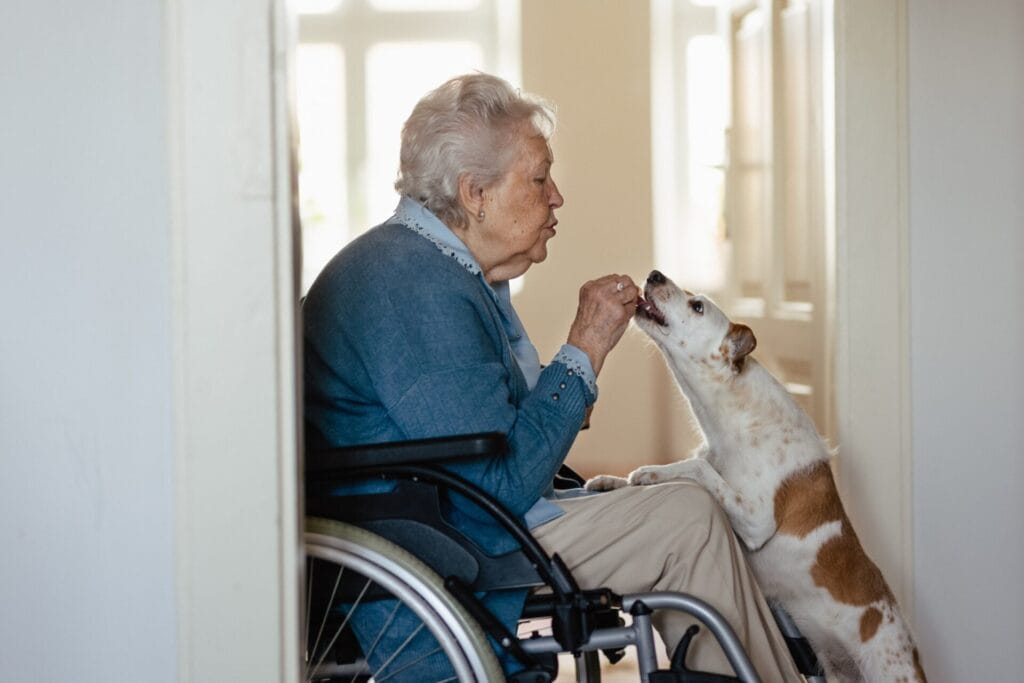Pet parenting offers numerous apparent benefits: unconditional love and limitless affection. However, there are also significant health benefits, particularly for older Americans, that aren’t as well-known. The benefits of dog ownership for seniors include increased opportunities for exercise, better cognitive function, and more socialization.
Dogs increase opportunities for exercise and outdoor activities, contribute to better cognitive function in older adults, and provide more socialization opportunities. Pet ownership is linked to health benefits such as decreased blood pressure, cholesterol levels, and triglyceride levels. Moreover, having a pet can reduce feelings of loneliness, anxiety, and PTSD. Research has shown that senior pet ownership offers numerous health benefits, as indicated in various well-respected publications and medical journals. The bond between people and their pets can increase fitness, lower stress, and bring happiness to their owners.
Safety and Security
One major benefit of dog ownership, especially for vulnerable individuals, is enhanced security. A barking dog can deter potential thieves, regardless of its size. Dogs possess a keen sense of hearing and smell, allowing them to detect potential dangers, such as intruders or fires. They can alert their owners to these threats and be trained to perform tasks like retrieving a phone or pressing a button to call for help.
Companionship
Loneliness often accompanies aging, leading to depression and physical issues. Dogs, with their unwavering companionship, can help alleviate these feelings. They mold their schedules and personalities to their owners, providing constant companionship. Smaller dogs, in particular, are easy to travel with and can accompany their owners wherever they go.
Introducing a dog into your life brings benefits far beyond companionship. Dogs offer varied advantages, including the joy of their company and the love they provide. Every walk or playtime session reinforces their affection, making them truly deserving of the title “man’s best friend.”
A Daily Routine
Caring for a dog can provide structure and purpose to daily life. Even on days when getting out of bed feels challenging, the presence of a dog can motivate you. A routine helps you stay focused and accomplish more, reducing uncertainty and stress by providing a sense of control over your life.
Making New Friends
Dog ownership can open doors to new social opportunities. Activities like communal walks and events hosted by animal and environmental organizations offer chances to meet new people. Dogs can be great icebreakers, facilitating social interactions and helping owners build relationships. However, it’s important to respect others’ boundaries, especially those with allergies or fears, by asking for permission before allowing your dog to interact with them.
Getting Outside
Owning a dog that requires regular outdoor activity ensures you stay connected with life. Activities like vet visits, grooming appointments, and daily walks increase social involvement and physical activity. Exercise benefits brain health and function, making dog ownership an excellent way to stay active.
Feeling Useful
While you need your dog, your dog also needs you. The desire to feel helpful and valuable persists even after retirement or when children become independent. Caring for another living being is immensely satisfying and is one of the most positive decisions you can make as you age.
Improved Cognitive Function
Interacting with dogs can enhance cognitive function and memory in seniors. Activities like petting, walking, or playing with a dog provide sensory stimulation, activating the brain’s reward centers and improving focus, memory, and attention. Reducing stress through pet interaction also contributes to cognitive improvements, as lower stress levels are associated with better brain health.
Lower Blood Pressure
Owning a pet can lead to lower blood pressure and a reduced risk of cardiovascular disease. Studies have shown that interacting with dogs can calm humans, thereby lowering blood pressure. Petting a dog for just 15 minutes can significantly reduce blood pressure for both the person and the dog. This interaction also offers additional health benefits, such as reduced stress and anxiety, improved mood, and increased physical activity.
Is Getting a Dog the Right Move for Senior Citizens?
Deciding to get a dog depends on various factors, including physical ability, lifestyle, living situation, and financial resources. Seniors should choose a pet that matches their energy level, schedule, and living conditions. It’s also essential to consider the financial costs of pet ownership, including food, veterinary care, and other expenses. Additionally, seniors should plan for their pet’s care in case they can no longer provide for them in the future.
If a senior is physically able, has the time and resources, and desires to care for a dog, pet ownership can offer numerous benefits. However, careful consideration of all factors is crucial before making this decision. For those unable to care for a dog, alternative interactions, such as volunteering at animal shelters or engaging with therapy dogs, can still provide the joy and benefits of dog ownership for seniors.




















